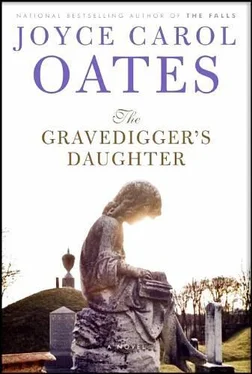Hazel would not afterward recall the sequence of events. She would not recall how many men there were for at least two continued working, at sinks; another came in later by a rear door, yawning and stretching. Several befriended her, cleared a place for her at their table setting aside tabloid papers, a crossword puzzle book, emptied Coke, 7-Up, beer cans. They were grateful for the miniature bottles she’d brought from the room. They would not accept her offer of $20 bills. They were: César, a youngish Hispanic with pitted skin and liquidy eyes; Marvell, a black man with skin the color of eggplant and a fleshy, tender face; Drake, a Caucasian of about forty, with an oddly flat face like a species of fish and glinting wire-rimmed glasses that gave him the look of an accountant, you would not take for a nighttime cook. And there was McIntyre, suspicious of Hazel initially but by quick degrees her friend, in his fifties, the man in the hotel uniform who made room service deliveries on call through the night. They were so curious of Hazel! She would tell them only her first name which was a name strange to them: “Haz-el” pronounced as if it were an exotic foreign word. They asked where she was from and she told them. They asked was she married, was her husband sleeping up in their room, what if he woke and saw that she was gone?
“He won’t wake. When he wakes, I will be there. It’s just I can’t seem to sleep now. This time of night…They say that people check into hotels who are planning to commit suicide. Why is that? Is it easier, somehow? I used to work in a hotel. When I was a girl. I was a chambermaid. This was back east, in upstate New York. It was not so large and luxurious a hotel as this. I was happy then. I liked the other hotel workers, I liked the kitchen staff. Except…”
The men listened avidly. Their eyes were fixed upon her. The Latino music continued. Hazel saw that the kitchen was vast, larger than any kitchen she had ever seen. The farther walls were obscured in shadow. Numerous stoves and all the stoves were mammoth: a dozen gas burners on each. There were large refrigerators built into a wall. Freezers, dishwashers. The space was divided into work areas of which only one was currently lighted and populated. The linoleum floor shone wetly, recently mopped. Plates were removed from carts and garbage scraped into plastic bags, the bags were tightly tied and placed inside large aluminum cans. The mood of the kitchen workers was heightened, jocular. Hazel might wonder if her presence had something to do with it. She’d taken the playing cards out of her pocket and stacked and shuffled them. Did they know gin rummy? Would they like to play gin rummy? Yes, yes! Very good. Gin rummy. Hazel shuffled the cards. Her fingers were slender and deft and the nails had been lacquered deep crimson. Skillfully Hazel dealt the cards to the men and to herself. The men laughed, their mood was exuberant. Now they knew Hazel was one of them, they could relax. They played gin rummy laughing together like old friends. They were drinking chilled Coors beer, and they were drinking from the miniature bottles Hazel had brought them. They were eating potato chips, salted nuts. Brazil nuts like those Gallagher had devoured up in the room. A phone rang, a hotel guest calling room service. McIntyre would have to put on his jacket, and make the delivery. He went away, and within a few minutes returned. Hazel saw that he was relieved she hadn’t left yet.
Cards were tossed onto the table, the set was over. Who had won? Had Hazel won? The men didn’t want her to leave, it was only 3:35 A.M. and they were on room-service duty until 6 A.M. Hazel stacked the cards together and shuffled and cut and shuffled again and began to deal. The front of her trench coat had loosened, the men could see the tops of her breasts pale and loose in the silky champagne-colored nightgown. She knew that her hair was disheveled, her mouth was a cloudy smear of old lipstick. Even one of her fingernails was chipped. Her body exuded an odor of old, stale panic. Yet she supposed she was an attractive woman, her new friends would not judge her harshly. “D’you know ”gypsy gin rummy‘? If I can remember, I’ll teach you.“
1998-1999
Lake Worth, Florida
September 14, 1998
Dear Professor Morgenstern,
How badly I wish that I could address you as “Freyda”! But I don’t have the right to such familiarity. I have just read your memoir. I have reason to believe that we are cousins. My maiden name is “Schwart” (not my father’s actual name, I think it was changed at Ellis Island in 1936) but my mother’s maiden name was “Morgenstern” and all her family was from Kaufbeuren as yours were. We were to meet in 1941 when we were small children, you and your parents and sister and brother were coming to live with my parents, my two brothers and me in Milburn, New York. But the boat that was carrying you and other refugees, the Marea , was turned back by U.S. Immigration at New York Harbor.
(In your memoir you speak so briefly of this. You seem to recall a name other than Marea . But I am sure that Marea was the name for it seemed so beautiful to me like music. You were so young of course. So much would happen afterward, you would not remember this. By my calculation you were 6, and I was 5.)
All these years I had not known that you were living! I had not known that there were survivors in your family. It was told to us by my father that there were not. I am so happy for you and your success. To think that you were living in the U.S. since 1956 is a shock to me. That you were a college student in New York City while I was living (my first marriage, not a happy one) in upstate New York! Forgive me, I did not know of your previous books, though I would be intrigued by “biological anthropology,” I think! (I have nothing of your academic education, I’m so ashamed. Not only not college but I did not graduate from high school.)
Well, I am writing in the hope that we might meet. Oh very soon, Frey-da! Before it’s too late.
I am no longer your 5-year-old cousin dreaming of a new “sister” (as my mother promised) who would sleep with me in my bed and be with me always.
Your “lost” cousin
Lake Worth, Florida
September 15, 1998
Dear Professor Morgenstern,
I wrote to you just the other day, now I see to my embarrassment that I may have sent the letter to a wrong address. If you are “on sabbatical leave” from the University of Chicago as it says on the dust jacket of your memoir. I will try again with this, care of your publisher.
I will enclose the same letter. Though I feel it is not adequate, to express what is in my heart.
Your “lost” cousin
P.S. Of course I will come to you, wherever & whenever you wish, Freyda!
Lake Worth, Florida
October 2, 1998
Dear Professor Morgenstern,
I wrote to you last month but I’m afraid that my letters were mis-addressed. I will enclose these letters here, now that I know you are at the “Institute for Advanced Research” at Stanford University, Palo Alto, California.
Its possible that you have read my letters and were offended by them. I know, I am not a very good writer. I should not have said what I did about the Atlantic crossing in 1941, as if you would not know these facts for yourself. I did not mean to correct you, Professor Morgen-stern, regarding the name of the very boat you and your family were on in that nightmare time!
In an interview with you reprinted in the Miami newspaper I was embarrassed to read that you have received so much mail from “relatives” since the memoir. I smiled to read where you said, “Where were all these relatives in America when they were needed?”
Truly we were here, Freyda! In Milburn, New York, on the Erie Canal.
Читать дальше












